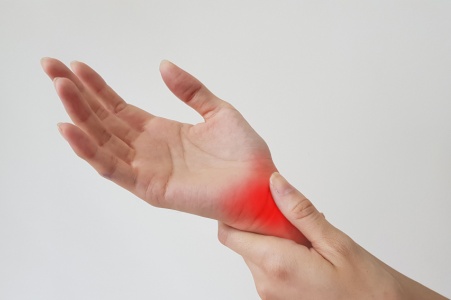Blog
Items filtered by date: September 2025
Typical Symptoms of Carpal Tunnel Syndrome

Carpal tunnel syndrome develops when the median nerve, which runs from the forearm into the hand, becomes compressed within the narrow passageway of the wrist. This condition often leads to numbness, tingling, or weakness in the hand and fingers, making daily tasks more difficult. The discomfort may begin gradually, starting with mild sensations in the thumb, index, or middle finger, but can progress into persistent pain or reduced grip strength. Repetitive hand motions and prolonged wrist positioning may contribute to the strain placed on the nerve. Over time, the muscles at the base of the thumb may weaken if the condition is not addressed. A chiropractor can evaluate the alignment of the wrist, elbow, and spine to determine where pressure on the nerve may be occurring and use gentle adjustments to improve mobility and reduce nerve irritation. If you are suffering from symptoms of carpal tunnel syndrome, it is suggested that you make an appointment with a chiropractor for an exam and treatment options.
Carpal Tunnel Syndrome
Carpal tunnel syndrome, or CTS, is a condition caused by compression of the median nerve, which runs through the carpal tunnel in the wrist. This tunnel is a narrow passageway surrounded by bones and ligaments, and when it becomes compressed or inflamed, it can put pressure on the nerve. Symptoms of CTS include tingling, numbness, weakness, and pain in the hand and fingers, often making simple tasks difficult and uncomfortable.
Chiropractic care offers a non-invasive approach to managing CTS by addressing alignment and reducing nerve pressure. Chiropractors start by evaluating the wrist, elbow, and even the cervical spine or neck, as misalignments in these areas can contribute to nerve compression in the wrist. Through gentle adjustments, chiropractors can improve the alignment of the wrist and spine, helping to reduce the pressure on the median nerve.
In addition to adjustments, chiropractors may use soft tissue therapy, such as stretching and myofascial release, to reduce inflammation surrounding the wrist and enhance mobility.
Why Consider Chiropractic for CTS?
Chiropractic care can provide lasting relief by targeting the root causes of CTS, reducing pain, and promoting long-term hand and wrist health.
Can Chiropractic Care Address Repetitive Strain as a Cause of CTS?
Chiropractic care can help manage repetitive strain by improving joint alignment and recommending ergonomic adjustments.
If you have any questions, please feel free to contact our office located in Largo, FL .
Managing Stress With Chiropractic Care

Stress is the body’s response to challenges that disrupt homeostasis, the balance needed for optimal health. It can be acute, occurring suddenly, or chronic, persisting over time and leading to fatigue and low energy. Risk factors include demanding jobs, lack of sleep, poor posture, and underlying health issues. Symptoms may involve headaches, muscle tension, irritability, digestive problems, and difficulty concentrating. Chiropractors can help by reducing spinal misalignments that interfere with nervous system function, improving circulation, and promoting relaxation. Restoring balance in the body can lessen the physical toll of stress and support overall well-being. If you are stressed or your energy level is low during the day, it is suggested that you consult a chiropractor who can offer natural solutions to manage these conditions.
Experiencing ongoing stress and low energy can wear down both body and mind, making even routine tasks feel overwhelming. The body’s stress response, designed for short bursts of activity, can exhaust physical and mental reserves when constantly activated, leaving a feeling of fatigue and burnout.
Chiropractic care offers a supportive way to manage these challenges by focusing on the body's alignment and nervous system function. Misalignment in the spine can increase tension, disrupting nerve signals and possibly contributing to feelings of low energy. Gentle adjustments can help relieve this tension, supporting better nervous system communication, which may encourage relaxation and boost energy levels.
Incorporating chiropractic care into a wellness routine can offer a holistic approach to managing stress and low energy, emphasizing balance, relaxation, and overall vitality for a more energized and resilient life.
1. How does stress affect the spine, and how can chiropractic care help?
Stress often leads to muscle tension and poor posture, which strain the spine. Chiropractic adjustments relieve this tension and promote better alignment.
2. How does chiropractic care improve sleep for better energy levels?
Adjustments relieve pain and tension, making it easier to fall asleep and stay asleep. Better rest directly boosts energy and resilience to stress.
If you have any questions please feel free to contact our office located in Largo, FL .
Causes of Herniated Discs

A herniated disk occurs when the soft inner portion of a spinal disk pushes through its tougher outer layer, often pressing on nearby nerves. This can cause pain, numbness, tingling, or weakness that radiates into the arms or legs, depending on the location of the disk. Common causes include aging, repetitive strain, heavy lifting, or sudden injury. Risk factors involve poor posture, excess weight, smoking, and occupations that demand physical labor. Chiropractic care offers non-invasive support by improving spinal alignment, reducing pressure on nerves, and restoring mobility. If you are struggling with back or neck pain related to a herniated disk, it is suggested that you visit a chiropractor to find natural, safe, and effective relief.
Bulging and herniated discs are common spinal conditions that can lead to persistent pain, discomfort, and limited mobility. A disc bulge occurs when the outer layer of the spinal disc begins to protrude, while a herniated disc involves a rupture that allows the inner gel-like core to seep out. Both conditions often compress nearby nerves, resulting in pain, tingling, numbness, and muscle weakness that can affect the back, legs, and even arms.
From a chiropractic perspective, addressing disc bulges and herniations focuses on reducing pressure on the spinal nerves and restoring proper spinal alignment. Chiropractors employ gentle, targeted adjustments designed to alleviate nerve compression and improve spinal mechanics. By correcting misalignments, chiropractic care can help reduce inflammation, enhance blood flow, and promote natural healing processes. This holistic approach aims to relieve pain without invasive procedures or medication.
For many patients, complementary therapies like spinal decompression, therapeutic exercises, and lifestyle guidance support long-term relief and function. Chiropractic care offers a non-surgical, drug-free path to managing disc issues, focusing on enhancing overall spinal health and reducing the likelihood of recurring symptoms. Each treatment plan is tailored to the patient’s specific needs and goals, ensuring an effective, individualized approach.
1. Is chiropractic treatment safe for herniated discs?
Generally, chiropractic care is safe for herniated discs when performed by a licensed professional who assesses the condition carefully. Mild adjustments or specific techniques are often used to avoid further injury.
2. How long does it take to see improvement?
Improvement times vary, but many patients notice reduced pain and better mobility within a few weeks of consistent chiropractic care, depending on the disc’s severity and other factors.
If you have any questions please feel free to contact our office located in Largo, FL .
Relieve Pain After Auto Accidents

If you are sore, stiff, or out of alignment after a car accident, you may be dealing with an injury to your spine, neck, or back. Even minor collisions can affect how your joints and muscles move, causing pain or limited mobility. Adjustments can support your recovery.
Recover from accident-related pain. Call today for an appointment.
Chiropractic Relief for Pinched Nerves

A pinched nerve occurs when excessive pressure is applied to a nerve by surrounding tissues, including muscles, bones, or tendons, and leads to discomfort and impaired function. Common causes include poor posture, spinal misalignment, herniated discs, or repetitive movements. Symptoms often involve pain, tingling, numbness, or weakness in the affected area, which may extend into the arms, hands, legs, or feet. Risk factors include aging, obesity, sedentary lifestyle, repetitive motions, and prior injuries. A chiropractor can help by correcting spinal and joint alignment, reducing nerve pressure, and restoring proper nervous system function to relieve pain and improve mobility. If you are experiencing nerve discomfort, it is suggested that you consult a chiropractor who can provide natural and effective treatment.
Pinched Nerve
A pinched nerve occurs when surrounding tissues, such as bones, muscles, or tendons, apply excessive pressure on a nerve. This condition can cause pain, numbness, tingling, or weakness, often in the neck, back, or limbs. Everyday activities, poor posture, or repetitive motions are common triggers. Left untreated, the condition may worsen, leading to chronic discomfort and reduced mobility.
Chiropractors use a hands-on approach to relieve the pressure that causes a pinched nerve. By performing gentle spinal adjustments, they create space for the nerve to function properly, alleviating discomfort. Chiropractic care may also include stretching exercises to improve flexibility and targeted muscle work to reduce surrounding tension. Patients often receive guidance on posture and activity modifications to prevent recurrence. This tailored approach focuses on restoring normal nerve function and improving overall quality of life.
1. Are pinched nerves only caused by spinal issues?
No, they can also result from tight muscles, inflammation, or repetitive strain. Chiropractors address both spinal and muscular causes.
2. How does a chiropractor determine the location of a pinched nerve?
Chiropractors use physical exams, mobility tests, and sometimes imaging studies like X-rays to pinpoint the source of nerve compression.
For additional information, please contact our office located in Largo, FL .
TMJ Disorder and Chiropractic Care

TMJ disorder affects the temporomandibular joint that connects the jawbone to the skull, causing pain and difficulty with movement. Causes can include jaw injury, teeth grinding, arthritis, or prolonged stress leading to muscle tension. Symptoms often involve jaw pain, clicking or popping sounds, headaches, ear discomfort, and difficulty chewing. A chiropractor can help by assessing alignment in the jaw, neck, and spine, using gentle adjustments and muscle therapies to reduce tension and improve function. They may also suggest exercises and lifestyle changes to ease strain on the jaw. If TMJ is interfering with eating, speaking, or comfort, it is suggested that you visit a chiropractor to restore jaw health and overall well-being.
TMJ: Temporomandibular Join Disorders
Temporomandibular Joint, or TMJ disorders, affect the hinge connecting the jaw to the skull, leading to pain and difficulty with jaw movement. Common causes include teeth grinding, jaw clenching, injury, or arthritis. Symptoms often include jaw pain, clicking or popping sounds when opening the mouth, headaches, and difficulty chewing. If left untreated, TMJ disorders can significantly impact daily activities, including eating and speaking.
Managing TMJ disorders typically involves lifestyle adjustments, such as stress reduction to minimize clenching and grinding, along with gentle jaw exercises to improve mobility. In some cases, wearing a night guard may help protect the joint from further strain.
Chiropractic care offers a unique approach to TMJ relief by focusing on the alignment of the jaw and neck. Chiropractors use gentle adjustments to reduce tension in the surrounding muscles and improve joint function. Techniques like myofascial release may be applied to alleviate tightness in the face and jaw area. By addressing related spinal or muscular imbalances, chiropractic care helps reduce pain and promote overall jaw health.
1. Can TMJ problems cause dizziness or vertigo?
Yes, TMJ dysfunction can affect the inner ear through muscle tension or nerve involvement, leading to balance issues or dizziness. Chiropractic adjustments to the neck and jaw can address alignment issues that contribute to dizziness.
2. Can chewing on one side worsen TMJ disorders?
Yes, consistently chewing on one side can overwork one side of the jaw, leading to imbalances and further TMJ issues. A chiropractor can restore balance to the jaw and surrounding muscles, reducing the impact of uneven chewing.
For additional information, please contact our office located in Largo, FL .
